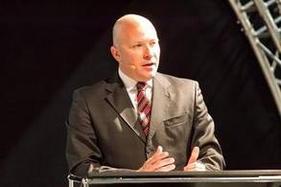Corporate Learning – Employees’ knowledge is the crucial factor for the success of any organization. Those who ask the right questions will be successful in the future.
What are these questions?
How can we continue to develop employees’ knowledge in businesses and organizations?
How can we make knowledge management one of our core competencies?
And how can we use this to develop our competitiveness at the European level as well?
There are many good and important questions that we encounter here at this trade show at the booths, lectures, and during the conference.
In many personal talks, I experience that there are people especially in the area of human resource management who really want to change things. People who are firmly convinced that employees determine the success of an organization. Corporate Learning is an important key to success.
But we also experience another discourse – when it comes to life-long learning, the public discourse and political commitment are limited to the areas:
- Kindergarten
- School
- Higher education
- and at most, learning for senior citizens
The 38 years of work in between are missing!
The discussions center primarily on names of Italian cities such as PISA and Bologna. Europe needs a new dimension here, a discourse that makes the 38 years of work the focus of life-long learning.
Corporate Learning needs attention.

